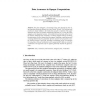Free Online Productivity Tools
i2Speak
i2Symbol
i2OCR
iTex2Img
iWeb2Print
iWeb2Shot
i2Type
iPdf2Split
iPdf2Merge
i2Bopomofo
i2Arabic
i2Style
i2Image
i2PDF
iLatex2Rtf
Sci2ools
ACG
2009
Springer
2009
Springer
Data Assurance in Opaque Computations
The chess endgame is increasingly being seen through the lens of, and therefore effectively defined by, a data ‘model’ of itself. It is vital that such models are clearly faithful to the reality they purport to represent. This paper examines that issue and systems engineering responses to it, using the chess endgame as the exemplar scenario. A structured survey has been carried out of the intrinsic challenges and complexity of creating endgame data by reviewing the past pattern of errors during work in progress, surfacing in publications and occurring after the data was generated. Specific measures are proposed to counter observed classes of error-risk, including a preliminary survey of techniques for using state-of-the-art verification tools to generate EGTs that are correct by construction. The approach may be applied generically beyond the game domain.
Related Content
| Added | 25 May 2010 |
| Updated | 25 May 2010 |
| Type | Conference |
| Year | 2009 |
| Where | ACG |
| Authors | Joe Hurd, Guy Haworth |
Comments (0)

